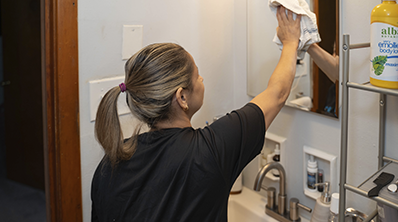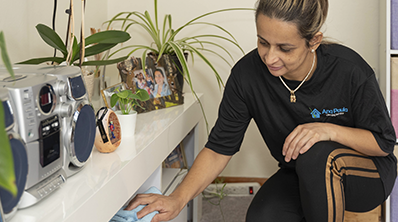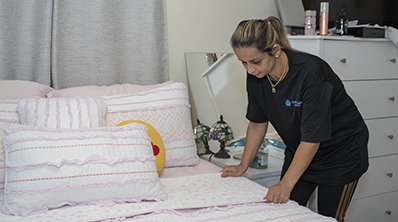The Health Benefits of Regular Office Cleaning
Most people associate office cleaning with appearances. A clean floor, polished desk, and organized workspace certainly look professional—but the real impact of regular cleaning goes far beyond how a space looks.
For office managers, business owners, and even homeowners who use their residence as a workspace in Pittsburgh, PA, cleanliness plays a direct role in health, productivity, and long-term performance.
This post explores the hidden connection between a clean environment and your team’s well-being—and why regular cleaning should be considered a health investment, not just a cosmetic routine.

The Office: A Breeding Ground for Germs
Modern offices are high-contact ecosystems. People come and go. Meetings are held. Phones, desks, keyboards, kitchen counters, and restrooms are touched dozens of times per day—often without anyone noticing.
Unlike hospitals or clinics, offices aren’t always viewed as environments where germs spread. But studies have shown that the average desk can harbor more bacteria than a toilet seat, especially when not cleaned regularly.
Key high-risk areas in offices include:
Shared breakroom appliances (microwaves, fridges, coffee machines)
Bathroom surfaces, especially sinks and door handles
Elevator buttons, light switches, and security keypads
Conference tables and shared workstations
Air vents and HVAC filters (if poorly maintained)
In colder months, especially in a city like Pittsburgh, where windows are closed and indoor heating is used daily, germs linger longer in the air and surfaces stay contaminated for longer periods of time.
How Regular Cleaning Improves Workplace Health
When professional cleaning is done consistently—not just before events or client visits—it creates a healthier work environment that supports employee well-being day in and day out.
Here are the main health benefits:
🦠 1. Reduction in Illness Transmission
Germs that cause colds, flu, stomach bugs, and even COVID-19 are often transferred by hand. Cleaning and disinfecting shared surfaces reduces these risks significantly, cutting down the number of sick days employees take annually.
🌬️ 2. Improved Indoor Air Quality
Dust, mold, and allergens accumulate quickly in HVAC systems, carpets, and neglected corners. Without proper cleaning, these irritants stay in circulation, causing respiratory symptoms, fatigue, and headaches.
🧠 3. Positive Mental Health Impact
Studies in environmental psychology show that cluttered, messy environments increase cortisol levels (stress hormone) and reduce concentration. A clean workspace supports mental clarity and emotional balance—especially in high-pressure jobs.
🪑 4. Physical Comfort and Ergonomics
Spilled food, trash buildup, and dust can cause odors and discomfort. Clean and well-maintained spaces reduce distractions and physical irritations that affect posture, focus, and task performance.
Real-World Impacts on Productivity
The health benefits of cleanliness translate directly into performance:
Fewer absences → more continuity in projects
Less distraction → better focus and task completion
Improved morale → stronger workplace culture
Better first impressions → improved client interactions
While these outcomes are hard to measure on a balance sheet, most business owners in Pittsburgh, PA can feel the difference when their office is consistently clean.
What “Regular Cleaning” Really Looks Like
It’s common to assume that a weekly vacuum and quick wipe-down is enough. But regular cleaning, when done properly, should be strategic.
Here’s a typical breakdown for an office with 5–20 staff members:
| Task | Frequency |
|---|---|
| Surface disinfection (desks, phones, etc.) | Daily or every other day |
| Trash removal | Daily |
| Kitchen & restroom cleaning | Daily or every 2 days |
| Floor vacuuming/mopping | 2–3x per week |
| Window & glass cleaning | Weekly to biweekly |
| Air vent and filter check | Monthly |
| Deep cleaning (baseboards, behind furniture) | Monthly to quarterly |
The right schedule depends on the type of work, number of employees, and how often clients visit your space.
Why It Matters for Businesses in Pittsburgh, PA
Pittsburgh’s climate includes snowy winters, humid springs, and pollen-filled autumns. These conditions bring mud, moisture, allergens, and salt residue into your office—on shoes, coats, and air particles.
Without regular cleaning:
Mold can grow in corners or carpet
Salt can stain flooring
Allergens build up on soft surfaces
Air quality declines during months when windows remain shut
In other words, skipping cleaning isn’t just an issue of appearances—it impacts air, health, and infrastructure.
Cleanliness and Company Culture
Employees notice when a workplace is clean. More importantly, they notice when it isn’t.
A consistently clean office:
Signals respect and care from leadership
Makes employees feel safer and more comfortable
Reinforces habits of organization and professionalism
Encourages responsibility for shared spaces
In contrast, a dirty, unmaintained environment creates low morale and detachment. When employees feel that their space isn’t valued, they begin to disengage.
Final Thoughts: Clean Spaces, Healthy Teams
Regular office cleaning isn’t about perfection—it’s about prevention.
By staying ahead of dust, bacteria, and clutter, you’re building a workspace where people can focus, breathe easier, and feel respected. And in a competitive business environment, that’s one of the most important advantages you can offer.
If you’re managing or working from a space in Pittsburgh, PA, consider this: cleaning doesn’t just protect your building—it protects your people.
📞 Ready to Get Started?
Fill out our form to connect with trusted cleaning services near you.
Let us help you find the right team so you can focus on what really matters.
Other Posts
- All Posts
COMPANY
CONTACT US
- Pittsburgh, PA
- +1 (774) 707-0274
- contact@anapaulacleaningservice.com









